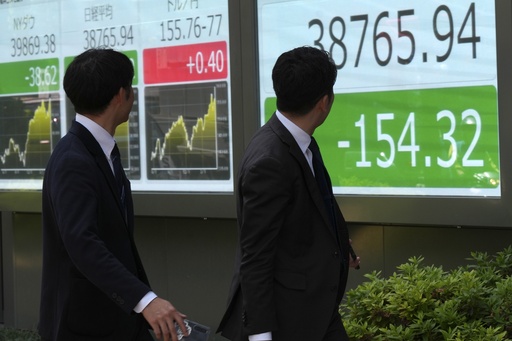Asian shares retreated on Friday after U.S. stocks edged back from their record heights, though the Dow Jones Industrial Average briefly topped 40,000 for the first time.
U.S. futures fell and oil prices edged higher.
Chinese stocks were little changed after officials in Beijing reported persisting weakness in the economy, especially in the real estate industry. The government was planning to announce revised property policies to revive the sector later Friday.
Hong Kong’s Hang Seng edged 0.1% higher to 19,396.14 and the Shanghai Composite index slipped 0.1% to 3,119.49.
In Tokyo, the Nikkei 225 declined 0.4% to 38,782.08, while Australia’s S&P/ASX 200 gave up 0.6% to 7,832.90.
South Korea’s Kospi fell 0.9% to 2,727.13.
On Thursday, the Dow slipped 0.1% to 39,869.38. The S&P 500 index, which is much more widely followed on Wall Street, dipped 0.2% to 5,297.10, and the Nasdaq composite fell 0.3% to 16,698.32. All three indexes had rallied on Wednesday to all-time highs.
Deere weighed on the market and sank 4.7% despite reporting stronger profit for its latest quarter than expected. It cut its forecast for upcoming profit this fiscal year, below analysts’ estimates, as farmers buy fewer tractors and other equipment.
Homebuilders also helped drag the market lower following a weaker-than-expected report on the housing industry. They gave back some of their big gains from the day before, when hopes for lower mortgage rates had sent them sharply higher. D.R. Horton sank 4.2%, Lennar fell 3.3% and PulteGroup dropped 2.8%.
Also sinking were GameStop and AMC Entertainment, which slid for a second straight day following their jaw-dropping starts to the week. GameStop fell 30%, though it’s still up nearly 59% for the week so far. AMC Entertainment lost 15.3%.
Such drops helped offset a 7% jump for Walmart, which reported stronger profit for the latest quarter than analysts expected. The retailer also said its revenue for the year could top the forecasted range it had earlier given.
Walmart’s strength could be an encouraging signal for the broader economy. Worries have been rising about whether U.S. households can keep up with still-high inflation and more expensive credit-card payments, particularly households at the lower end of the income spectrum.
Chubb rose 4.7% after Warren Buffett’s Berkshire Hathaway disclosed it had built an ownership stake in the insurer.
Stronger-than-expected profit reports have been one of the main reasons U.S. stock indexes have broadly jumped through May to records following a tough April. Another has been revived hopes that the Federal Reserve will be able to cut its main interest rate at least once this year. The Fed has been keeping its federal funds rate at the highest level in more than two decades.
A string of worse-than-expected reports on inflation at the start of the year had put the potential for such cuts in jeopardy, but some more encouraging data has since arrived.
Treasury yields have largely eased in May as hopes rose that the economy could hit the hoped-for sweet spot, where it cools enough because of high interest rates to stifle inflation but not so much that it causes a bad recession.
Yields rose Thursday following some mixed data on the economy, including the report that hurt homebuilder stocks, which showed the industry broke ground on fewer projects than expected.
One report showed slightly more workers applied for unemployment benefits last week than economists expected, though the number remains low compared with history. Others said manufacturing growth in the mid-Atlantic region was weaker than hoped and import prices rose more than forecast.
In other trading, benchmark U.S. crude oil edged 2 cents higher to $79.25 per barrel. Brent crude, the international standard, added 15 cents to $83.42 per barrel.
The U.S. dollar rose to 155.84 Japanese yen from 155.40 yen. The euro slipped to $1.0859 from $1.0868.
___
AP Business Writer Stan Choe contributed.


